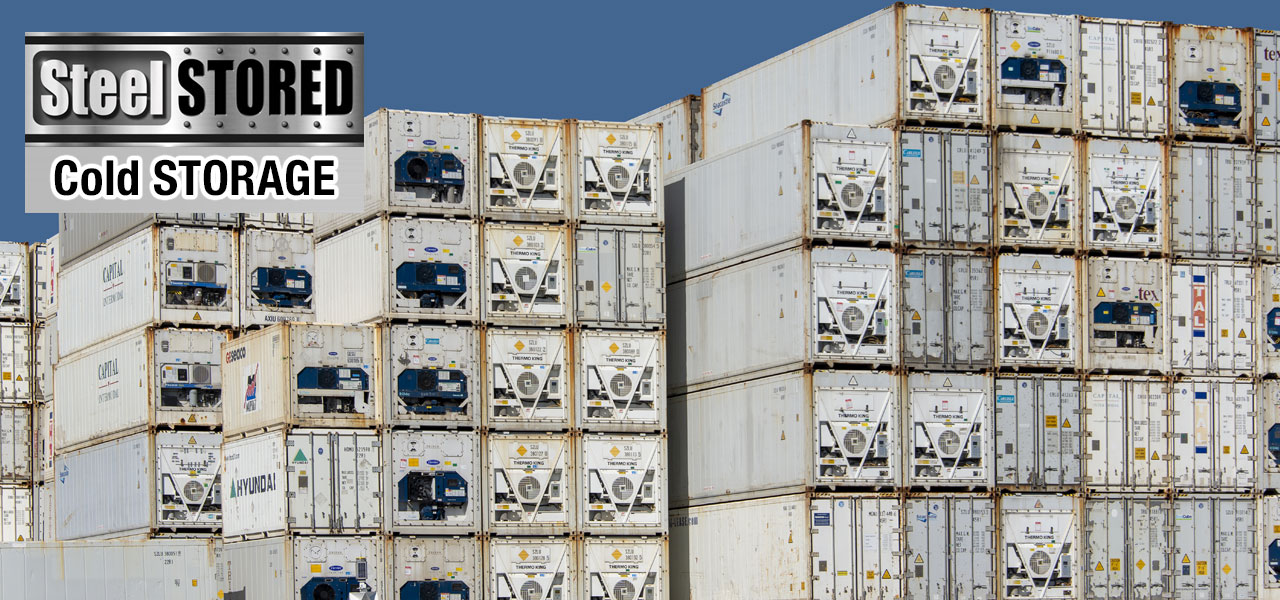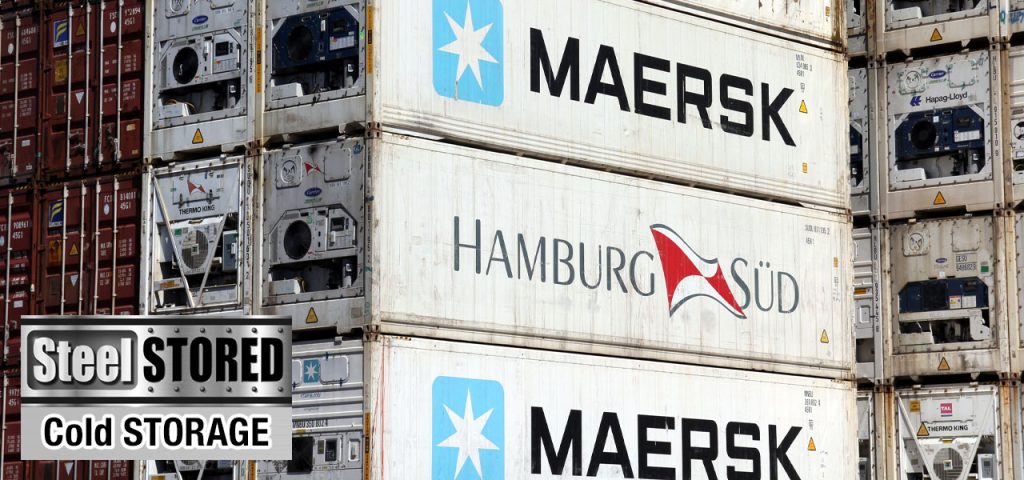
Refrigerated Shipping Containers – Energy-efficient, Flexible, Low-Cost, Resaleable and More
This has been a disruptive era of extreme weather, inflation, increased regulatory scrutiny and non-stop shifts in the market. If your business or nonprofit demands temperature-controls that means you also are being hit with critical energy issues, everything from reliability to cost. More products are temperature-sensitive.
There is good news, though. The refrigerated shipping container – nicknamed “reefer” – has been coming to the rescue. Globally, documents P&S Market Research, its growth rate through 2030 will be eight percent. We at SteelSTORED are introducing reefer to you as yet another innovative use of the traditional shipping container. Those have ranged from pop-up stores to above-ground pools. Unlike the basic shipping container, which is essentially a steel shell, the reefer is already retrofitted with the two necessary components: the refrigeration unit and flooring. You can put it right to work. Or, you can take the next step of customization, adding shelving and partitions, for instance.
Temperature-Sensitive, From Oceans to Posh Restaurants
What is your business or nonprofit? If it is electronic equipment, commercial food and beverages, growing crops, a food bank, pharmaceuticals, blood plasma or mobile medical testing, it is probably temperature-sensitive. You are also likely burdened with concerns or actual regulations about humidity and airflow. Drop the ball and you might lose thousands of dollars from spoiled produce or damaged equipment.
However, those aspects of “taking care of business” do not have overwhelm or be expensive – not even in this time of climate change. Beginning 40 years ago the refrigerated shipping container has facilitated the logistics of managing temperature in the worst kinds of ocean environments and extreme-weather ports. And it has accomplished that cost-effectively. What designers learned during those years they have applied to today’s reefer. The materials and systems are state-of-the-art. Yet, both the purchase and the maintenance costs remain a good deal.
Through temperature controls industries are extending the shelf life of their products. So, yes, it is a smart investment to put a reefer in back of that posh restaurant. Forced by climate change to tend the fields at night, farmers can store immediately perishable crops in reefers and ship them in those same containers to market. Blood plasma and other medical supplies can be preserved at the right temperature in reefers and transported in them to the flood zone or wildfire.

With Reefers, Your 10 Advantages
Businesses and nonprofits come to SteelSTORED and ask: Should I “invest” in building a permanent building for refrigeration or go with a mobile refrigerated shipping container? We point out 10 advantages.
Not Tying Up Much Capital. Although there are plenty of variables which figure into the specific pricing, reefers are less expensive than other modalities of refrigeration. Those include constructing a new building.
Energy-Efficiency. The technology is all advanced. That means that it could be in your financial self-interest to ditch your current refrigeration systems which could be increasingly expensive to operate. Reefers have these state-of-the-art components: compressor, controller, evaporator fans, fresh-air vents, unit evaporator and condenser sections. Regular cleaning and maintenance can limit problems with refrigerant leaks, compressor failure and fan motor malfunction.
Fast Implementation. There is no setup. Also you can quickly have it where you need it. We at SteelSTORED arrange the transportation to your site by truck, train, airplane or ship. In contrast, construction of a building could take months.
Bypassing Zoning. Forget red-tape nightmares. In most jurisdictions, the containers are classified as “temporary.” However, if your business or nonprofit involves edibles you have to comply with the federal, state and local rules.
Portability. You can both store content in reefers and use those same containers for shipping. Since you do not have to unpack and pack that can prevent spoilage, damage and theft.
Heavy-Duty Insulation. That is a standard feature. It ensures consistent temperature levels, no matter the external conditions. That reduces the odds of temperature fluctuations which can make products unusable.
Durability and Security. Shipping containers are designed to withstand the harshness of travel over oceans. Their steel structure insulates them from weather, floods and theft.
Utility of Flooring. The flooring is functional. There are two types. One is flat. It can support shelving as well as moveable partitions for creating multiple temperature zones. Frozen food can be placed in some and chilled produce in others.
The second kind of flooring is the duct kind. It is for cargo uses. The slightly raised planks ensure the necessary airflow for long trips.
Scalability. Unlike permanent construction, more space can be easily and rapidly added. That is by stacking the units vertically or attaching them horizontally. That means if you expand your business or the reach of the nonprofit you can simultaneously increase the refrigeration capacity.
Flexibility + Eco-Friendly. Market conditions can change on a dime. The restaurant owners can reconfigure the enterprise as a doggy daycare. No need for all that refrigeration capacity. Shipping containers usually hold on to their value and can be sold. This recycling brands the business or nonprofit as green.
SteelSTORED, Leader in Innovation
We at SteelSTORED are here for you, every step of the way in your purchasing journey. We begin by listening. That is the most important part of our complimentary consultations. But we are a “trained listener.” As a leader in the innovative uses of shipping containers we have the experience to anticipate your needs. Then we guide you in all the details about buying, transporting and maintaining your refrigerated shipping container. Will a 20’ be too small? Should you buy new or used? Yes, we provide quotes free and quickly. Please connect with us at [email protected] or 203-705-8251.
